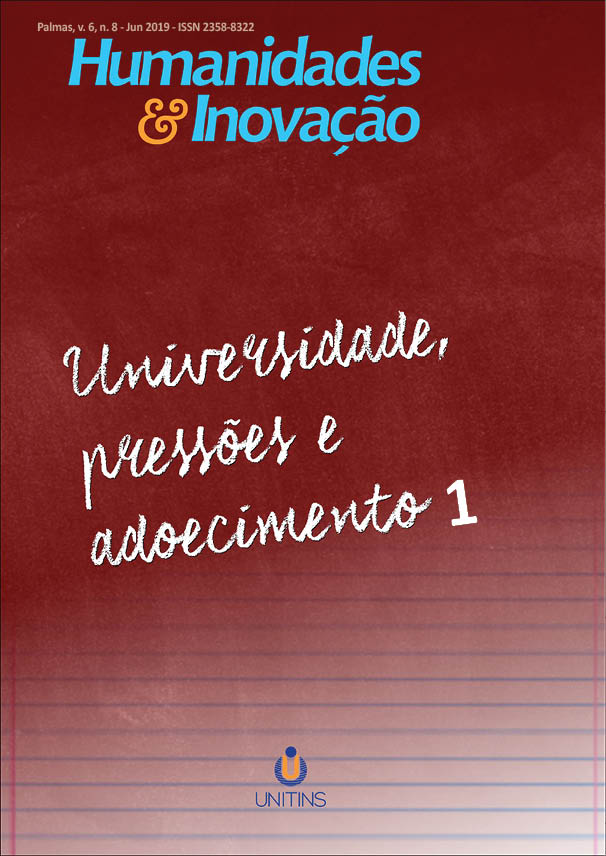APLICABILIDADE DE METODOLOGIAS ATIVAS DE APRENDIZAGEM BASEADA EM PROBLEMAS EM CURSOS DE GRADUAÇÃO EM ENGENHARIA
Abstract
Neste estudo, apresentam-se os resultados da metodologia de aprendizagem baseada em problemas (PBL) em um curso de Engenharia no Brasil. O objetivo da aplicação do PBL é se melhorar o desempenho e a aprendizagem discente nas disciplinas específicas do curso de Engenharia, no intuito de fomentar a motivação e correlacionar teoria e prática. A utilização de PBL se deve ao fato da existência de um quadro de desmotivação e resistência por parte dos discentes quanto ao método de ensino clássico/ tradicional. Dessa forma, partiu-se da hipótese de que uma metodologia voltada para uma participação ativa do discente, bem como a oportunidade de lidar com problemas fosse capaz de engendrar motivação e minimizar o número de evasões. A metodologia utilizada para o estudo foi a de pesquisa-ação, em que os sujeitos também atuam como agentes. Os resultados indicaram um ótimo retorno no aprendizado e desempenho discentes com a utilização de PBL.
References
ARANZABAL, A.; EPELDE, E.; ARTETXE, M. Monitoring questionnaires to ensure positive interdependence and individual accountability in a chemical process synthesis following collaborative PBL approach. Education for Chemical Engineers, 2018. Disponível em https://doi.org/10.1016/j.ece.2018.06.006.
Acesso em 16/11/2018.
ARRUE, Marta et al. Effect of a PBL teaching method on learning about nursing care for patients with depression. Nurse education today, v. 52, p. 109-115, 2017. Disponível em https://doi.org/10.1016/j.nedt.2017.02.016. Acesso em 16/11/2018.
BERBEL, Neusi Aparecida Navas. A problematização e a aprendizagem baseada em problemas: diferentes termos ou diferentes caminhos?. Interface-Comunicação, Saúde, Educação, v. 2, p. 139-154, 1998. Disponível em http://dx.doi.org/10.1590/S1414-32831998000100008. Acesso em 16/11/2018.
DE REZENDE JÚNIOR, R. A. et al. Aplicabilidade de metodologias ativas em cursos de graduação em engenharia. In: CONGRESSO BRASILEIRO DE EDUCAÇÃO EM ENGENHARIA, 41., 2013, Gramado. Anais... Gramado: UFRGS, 2013. Disponível em http://www.fadep.br/engenharia-eletrica/congresso/pdf/118003_1.pdf. Acesso em 16/11/2018.
FERNANDES, Sandra Raquel Gonçalves. Preparing graduates for professional practice: findings from a case study of Project-based Learning (PBL). Procedia-social and behavioral sciences, v. 139, p. 219-226, 2014. Disponível em https://doi.org/10.1016/j.sbspro.2014.08.064. Acesso em 16/11/2018.
Giordan, A. Aprender. Instituto Piaget. - Av. Joao Paulo II, Lote 544, 2. - Lisboa. Editions Belin, 1998.
HAMBURG, Ileana; VLADUT, Gabriel. PBL–Problem Based Learning for Companies and Clusters. Transportation research procedia, v. 18, p. 419-425, 2016. Disponível em https://doi.org/10.1016/j.trpro.2016.12.055. Acesso em 16/11/2018.
HUNG, Woei. All PBL starts here: The problem. Interdisciplinary Journal of Problem-Based Learning, v. 10, n. 2, p. 2, 2016. Disponível em https://doi.org/10.7771/1541-5015.1604. Acesso em 16/11/2018.
NAJDANOVIC-VISAK, Vesna. Team-based learning for first year engineering students. Education for Chemical Engineers, v. 18, p. 26-34, 2017. Disponível em https://doi.org/10.1016/j.ece.2016.09.001. Acesso em 16/11/2018.
ORTIZ, Daniela; HUBER-HEIM, Karin. From information to empowerment: Teaching sustainable business development by enabling an experiential and participatory problem-solving process in the classroom. The International Journal of Management Education, v. 15, n. 2, p. 318-331, 2017. Disponível em https://doi.org/10.1016/j.ijme.2017.03.008. Acesso em 16/11/2018.
Pozo, J. I. Aprendizes e mestres: a nova cultura da aprendizagem / Juan Ignacio Pozo; trad. Ernani Rosa. – Porto Alegre: Artmed Editora, 2002.
PROMENTILLA, Michael Angelo B. et al. Problem-based learning of process systems engineering and process integration concepts with metacognitive strategies: The case of P-graphs for polygeneration systems. Applied Thermal Engineering, v. 127, p. 1317-1325, 2017. Disponível em https://doi.org/10.1016/j.applthermaleng.2017.08.086. Acesso em 16/11/2018.
ROVERS, Sanne FE et al. Improving student expectations of learning in a problem-based environment. Computers in Human Behavior, 2018. Disponível em https://doi.org/10.1016/j.chb.2018.02.016. Acesso em 16/11/2018.
SEMAN, Laio O. et al. MPPTjs: A JavaScript Simulator for PV Panels Used in a PBL Application. Energy Procedia, v. 107, p. 109-115, 2017. Disponível em https://doi.org/10.1016/j.egypro.2016.12.141. Acesso em 16/11/2018.
TAN, Chin Pei; VAN DER MOLEN, H. T.; SCHMIDT, H. G. To what extent does problem-based learning contribute to students' professional identity development?. Teaching and Teacher Education, v. 54, p. 54-64, 2016. Disponível em https://doi.org/10.1016/j.tate.2015.11.009. Acesso em 16/11/2018.
TORTORELLA, Guilherme; CAUCHICK-MIGUEL, Paulo. Combining traditional teaching methods and PBL for teaching and learning of lean manufacturing. IFAC-PapersOnLine, v. 51, n. 11, p. 915-920, 2018. Disponível em https://doi.org/10.1016/j.ifacol.2018.08.465. Acesso em 16/11/2018.
TRONCON, Luiz Ernesto de Almeida. Estruturação de sistemas para avaliação programática do estudante de medicina. Rev. bras. educ. méd, v. 40, n. 1, p. 30-42, 2016. Disponível em http://dx.doi.org/10.1590/1981-52712015v40n1e01392015. Acesso em 16/11/2018.
VARGAS, Adriana; PORTILHO, Evelise Maria Labatut. Metacognição em Grupos de Problem-based Learning (PBL). Educação. Revista do Centro de Educação, v. 42, n. 2, p. 421-434, 2017. Disponível em http://www.redalyc.org/service/redalyc/downloadPdf/1171/117153744014/7. Acesso em 16/11/2018.
Copyright Notice
The submission of originals to this periodic implies in transference, by the authors, of the printed and digital copyrights/publishing rights. The copyrights for the published papers belong to the author, and the periodical owns the rights on its first publication. The authors will only be able to use the same results in other publications by a clear indication of this periodical as the one of its original publication. Due to our open access policy, it is allowed the free use of papers in the educational, scientific and non-commercial application, since the source is quoted (please, check the Creative Commons License on the footer area of this page).











